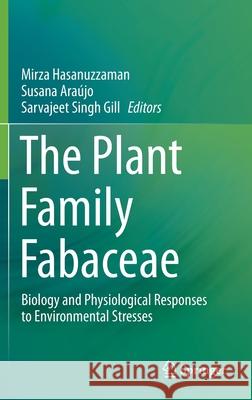The Plant Family Fabaceae: Biology and Physiological Responses to Environmental Stresses » książka



The Plant Family Fabaceae: Biology and Physiological Responses to Environmental Stresses
ISBN-13: 9789811547515 / Angielski / Twarda / 2020 / 541 str.
The Plant Family Fabaceae: Biology and Physiological Responses to Environmental Stresses
ISBN-13: 9789811547515 / Angielski / Twarda / 2020 / 541 str.
(netto: 653,27 VAT: 5%)
Najniższa cena z 30 dni: 655,41
ok. 22 dni roboczych
Bez gwarancji dostawy przed świętami
Darmowa dostawa!
1. The biology of legumes and their agronomic, economic and social impact.- 2.Tropical Legumes: Status, Distribution, Biology and Importance.- 3.Nitrogen fixation of legumes: Biology and physiology.- 4.Nitrogen fixation of legumes under the family Fabaceae: Adverse effect of abiotic stresses and mitigation strategies.- 5.Genetic engineering and genome editing for the improvement of Fabaceae for abiotic stress tolerance.- 6.GWAS and genomic approaches in Legumes, an expanding toolkit for examining responses to abiotic stresses.- 7.Use of Osmolytes for Improving Abiotic Stress Tolerance in Fabaceae Plants.- 8.Role of biostimulants for enhancing abiotic stress tolerance in Fabaceae plants.- 9.Abiotic and biotic stresses interaction in Fabaceae plants. Contributions from the grain legumes–soilborne vascular diseases–drought stress triangle.- 10.Leguminosae (nom. alt. Fabaceae) – Its Diversity, Use and Role in Environmental Conservation in the Harsh Environs of the Cold Deserts of North West India.- 11.Morphological, physiobiochemical and molecular adaptability of legumes of Fabaceae to drought stress, with special reference to Medicago sativa L..- 12.Phaseolus species responses and tolerance to drought.- 13.Fabaceae plants responses and tolerance to high temperature stress.- 14.Legume responses and adaptations to nutrient deficiencies.- 15.Nutrient Management for improving abiotic stress tolerance in legumes of the family Fabaceae.- 16.Fabaceous Plants Under Abiotic Stresses and Biochemical Functions of Micronutrients.- 17.Response and tolerance of Fabaceae plant to metal/metalloid toxicity.- 18.Oxidative stress and antioxidant defense in Fabaceae plants under abiotic stresses.- 19.Threat imposed by O3 induced ROS on defence, nitrogen fixation, physiology, biomass allocation and yield of legumes.- 20.Salinity Stress Responses in Three Popular Field Crops Belonging to Fabaceae Family: Current Status and Future Prospect.
Dr. Mirza Hasanuzzaman is a Professor of Agronomy at Sher-e-Bangla Agricultural University, Dhaka, Bangladesh. He received his PhD on ‘Plant Stress Physiology and Antioxidant Metabolism’ from the United Graduate School of Agricultural Sciences, Ehime University, Japan with Japanese Government (MEXT) Scholarship. Later, he completed his postdoctoral research in Center of Molecular Biosciences (COMB), University of the Ryukyus, Okinawa, Japan with ‘Japan Society for the Promotion of Science (JSPS)’ postdoctoral fellowship. Subsequently, he joined as Adjunct Senior Researcher at the University of Tasmania with Australian Government’s Endeavour Research Fellowship. Prof. Hasanuzzaman has been devoting himself in research in the field of Crop Science, especially focused on Environmental Stress Physiology since 2004. Prof. Hasanuzzaman published over 100 articles in peer-reviewed journals and books. He has edited 12 books and written 35 book chapters on important aspects of plant physiology, plant stress responses, and environmental problems in relation to plant species. These books were published by the internationally renowned publishers. Prof. Hasanuzzaman is a research supervisor of undergraduate and graduate students and supervised 20 M.S. students so far. He is Editor and Reviewer of more than 50 peer reviewed international journals and recipient of ‘Publons Global Peer Review Award 2017, 2018 and 2019’. Prof. Hasanuzzaman is active member of about 40 professional societies and acting as Publication Secretary of Bangladesh Society of Agronomy. He has been honored by different authorities due to his outstanding performance in different fields like research and education. He received the World Academy of Science (TWAS) Young Scientist Award 2014. He attended and presented 25 papers and posters in national and international conferences in different countries (USA, UK, Germany, Australia, Japan, Austria, Sweden, Russia, etc.).
This book comprehensively introduces all aspects of the physiology, stress responses and tolerance to abiotic stresses of the Fabaceae plants. Different plant families have been providing food, fodder, fuel, medicine and other basic needs for the human and animal since the ancient time. Among the plant families Fabaceae have special importance for their agri-horticultural importance and multifarious uses apart from the basic needs. Interest in the response of Fabaceae plants toward abiotic stresses is growing considering the economic importance and the special adaptive mechanisms. Recent advances and developments in molecular and biotechnological tools has contributed to ease and wider this mission. This book provides up-to-date findings that will be of greater use for the students and researchers, particularly Plant Physiologists, Environmental Scientists, Biotechnologists, Botanists, Food Scientists and Agronomists, to get the information on the recent advances on this plant family in regard to physiology and stress tolerance.
1997-2025 DolnySlask.com Agencja Internetowa
KrainaKsiazek.PL - Księgarnia Internetowa









